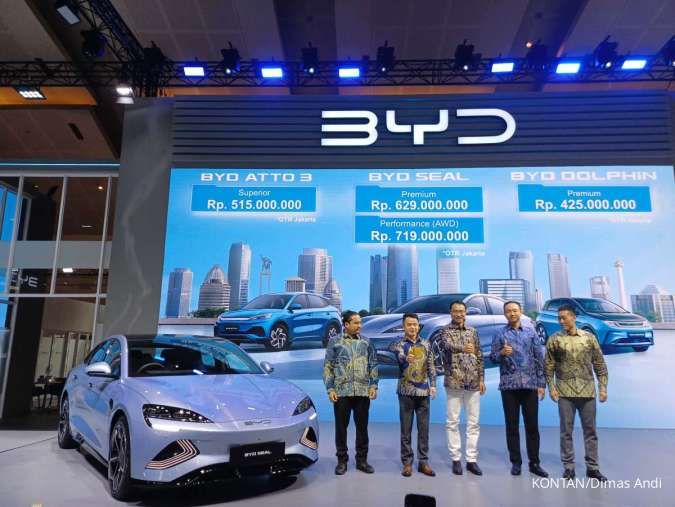BYD's Global EV Push: Challenges To Ford's Diminishing Brazilian Influence

Table of Contents
BYD's Aggressive Global EV Strategy and its Impact on Brazil
BYD, a leading Chinese manufacturer, has implemented a strategic focus on emerging markets, recognizing their immense growth potential in the EV sector. This aggressive global expansion strategy is fueled by several key factors:
- Competitive Pricing: BYD offers EVs at competitive price points, making them accessible to a broader range of consumers in price-sensitive markets like Brazil.
- Diverse Model Offerings: BYD provides a diverse portfolio of EVs, catering to various consumer needs and preferences, from compact city cars to larger SUVs.
- Localized Production: Establishing manufacturing plants in key markets, including Brazil, reduces transportation costs and allows for quicker adaptation to local demands. This localized production is crucial for success in the Brazilian EV market.
- Investment in Infrastructure: BYD is actively investing in charging station infrastructure in Brazil, addressing a crucial barrier to EV adoption. This proactive approach strengthens its position in the market and encourages consumer confidence.
- Strategic Partnerships: Collaborations with local Brazilian companies provide BYD with access to established distribution networks and valuable local expertise.
This multifaceted approach has enabled BYD to achieve rapid market penetration in Brazil, directly impacting the established players like Ford.
Ford's Declining Market Share in Brazil and the Reasons Behind It
Ford's recent performance in the Brazilian automotive market has been characterized by declining sales figures and a shrinking market share. Several factors contribute to this downturn:
- Lack of Investment in EV Technology: Compared to BYD's significant investments in EV technology, Ford's efforts in this area have lagged, leaving them less competitive in the rapidly growing EV segment.
- Increased Competition: Ford faces intensified competition not only from BYD but also from other international and domestic automotive brands offering a wider range of vehicles at various price points.
- Economic Challenges: Economic fluctuations and instability within the Brazilian market have impacted consumer spending on vehicles, further exacerbating Ford's challenges.
- Shifting Consumer Preferences: Brazilian consumers are increasingly embracing EVs and other fuel-efficient vehicles, a trend that Ford has been slower to capitalize on.
These combined factors have significantly eroded Ford's once-dominant position in the Brazilian auto market.
The Specific Challenges posed by BYD to Ford in the Brazilian EV Sector
The competition between BYD and Ford in Brazil's EV sector is particularly acute. BYD holds several key competitive advantages:
- Superior Battery Technology: BYD's advanced battery technology translates into superior vehicle performance, longer range, and enhanced reliability, making its EVs more appealing to consumers.
- Aggressive Pricing Strategies: BYD's competitive pricing undercuts many of Ford's offerings, attracting budget-conscious consumers.
- Regulatory Advantages: BYD might have secured certain regulatory advantages within the Brazilian market, further strengthening its competitive position.
These factors combine to create a formidable challenge for Ford, especially in the burgeoning Brazilian EV market.
The Future of the Brazilian EV Market and the Implications for BYD and Ford
The Brazilian EV market holds significant growth potential, driven by government incentives, increasing environmental awareness, and falling battery prices. The long-term prospects for BYD and Ford in Brazil depend heavily on their adaptability and strategic responses.
- BYD's Future: BYD's proactive approach and strong EV portfolio position it well for continued growth in Brazil. Further investments in infrastructure and localized production will likely cement its position.
- Ford's Future: Ford needs to significantly increase its investment in EV technology and develop a more competitive range of electric vehicles if it hopes to regain market share. Failure to adapt could lead to a continued decline.
The potential for collaboration between the two companies seems unlikely given the intense competition, but the future will likely see increased competition for market share. Predicting exact market share is difficult, but BYD's current trajectory suggests it will significantly increase its presence while Ford's share may continue to decline unless significant changes are implemented.
Conclusion
BYD's aggressive global EV push, and its significant inroads into the Brazilian market, pose a substantial challenge to Ford's diminishing influence. While Ford's legacy and brand recognition still hold some weight, BYD’s focus on advanced EV technology, competitive pricing, and strategic market penetration are reshaping the Brazilian automotive landscape. The future of the Brazilian EV market hinges on how both companies adapt to the changing dynamics. To stay informed on this exciting and rapidly evolving sector, continue to follow developments in the BYD Brazil and Ford Brazil markets, and watch as the competition for electric vehicle dominance intensifies.

Featured Posts
-
 The Hobbit The Battle Of The Five Armies Behind The Scenes And Production Details
May 13, 2025
The Hobbit The Battle Of The Five Armies Behind The Scenes And Production Details
May 13, 2025 -
 Yamamotos 6 Inning Masterpiece Leads Dodgers To 3 0 Victory Over Cubs
May 13, 2025
Yamamotos 6 Inning Masterpiece Leads Dodgers To 3 0 Victory Over Cubs
May 13, 2025 -
 Tempah Byd Ev Di Mas 2025 And Dapatkan Kredit Cas Rm 800 9 15 Mei Sertai Konsert Rentak Elektrik
May 13, 2025
Tempah Byd Ev Di Mas 2025 And Dapatkan Kredit Cas Rm 800 9 15 Mei Sertai Konsert Rentak Elektrik
May 13, 2025 -
 Analyzing The Impact Of Restored Trump Tariffs On Europe
May 13, 2025
Analyzing The Impact Of Restored Trump Tariffs On Europe
May 13, 2025 -
 April Zaciatok Zberu Dat Pre Novy Atlas Romskych Komunit
May 13, 2025
April Zaciatok Zberu Dat Pre Novy Atlas Romskych Komunit
May 13, 2025
